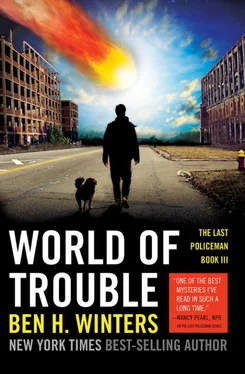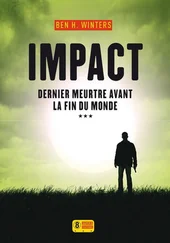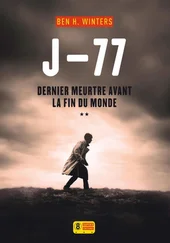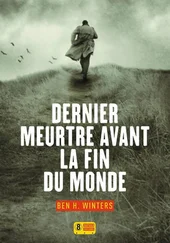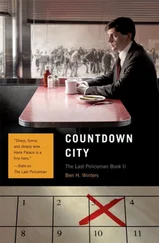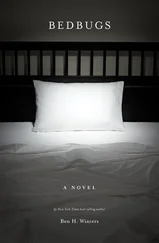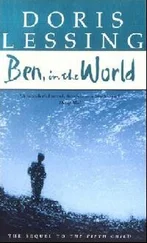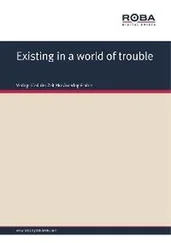The black-bearded old man nods at the detail. The south barn, I’m thinking. The trouble, I’m thinking. They mean this illusory plague, they mean a different kind of trouble than everyone else. The title “Father,” I’m gathering, is as much honorific as literal. The man who shot at me on the path is the respected patriarch, the elder sage of this family or gathering of families. The others bow their heads slightly when he speaks, not as if in worship but as a mark of deference.
“You, friend,” he says now, turning to me, speaking slowly and evenly. “We wonder, did you climb up into the south barn through its window and light a match for a cigarette or for light and put the match down carelessly? Is that what happened?”
The same challenging expression, cold and clear.
I take a sip from my water glass, clear my throat. “Yes, sir,” I say, giving it back to him, striking a truce. “That’s what happened. I lit a match so I could see and put the match down carelessly.”
Father nods. A murmur passes across the table, the men whispering to each other, nodding. The children at their separate tables have mostly lost interest, they’re eating and chattering idly to one another. The only decoration in the room is a wall calendar, spread open to September, a line drawing of a mostly bare oak, the last leaves tumbling to Earth.
“And if we may ask, sir, you are fleeing from the pandemic?” This from one of the younger men, a sturdy character with a beard and face to match his father’s.
I answer him tentatively. “That’s right. Yes. I have traveled from my home to escape it.”
“God’s will,” he murmurs, and the rest of them say it too, look down at their plates, “God’s will.”
Father stands now, draws up to full height, and places his hand on the shoulders of one of the children. “It is through God’s grace that Ruth saw the fire from her bedroom window, way off in the distance, and awoke the house.”
All eyes turn to the girl whom I saw cheating during the prayer. Her cheeks go from rosy red to bright pink. A couple of the smaller children giggle.
“Thank you, young lady,” I tell her, and I mean it, but the girl doesn’t respond, she keeps her eyes trained on her plate of stewed vegetables. “Answer our guest, Ruthie,” says her grandmother gently, nodding to the girl. “Our guest said thank you.”
“Thanks be to God,” says Ruthie, and the others nod their approval, the men and the women and even the littlest kids, murmuring in uneven chorus, “Thanks be to God.” I have nailed down the number of people in the room at thirty-five: six adult men and seven women, plus twenty-two children ranging from toddler to late adolescence. They don’t know. I look at the old man, I look around the room at this silent happy family, and I know that they don’t know. These people don’t know about the asteroid at all.
You mustn’t say those words , he told me. When I said that I had to save my sister before the end of the world, he said you mustn’t say those words .
They don’t know and you can see it on their peaceful Amish faces, that bloom of happiness you just don’t see anymore. Because of course a pandemic would be an absolute calamity, some deadly virus stalking the land, and you would huddle up with your family and shut out the world until it ended, but then it would—it would have an ending. A pandemic runs its course and then the world recovers. These people in this room don’t know that the world will not be recovering, and I can see it, as they finish their lunch and say more prayers and rise, laughing, to clear the plates. I can feel it, a feeling I never had occasion to notice until it disappeared, the odorless colorless presence of the future.
“I would speak with our guest alone,” says the old man abruptly. “We will walk the property.”
“Atlee,” says his wife, the old woman. “He is tired. He is wounded. Let him eat and return to bed.”
“Thank you, ma’am, but I’m feeling just fine.”
That’s not true; I feel like I’ve been hit by a garbage truck. My side hurts each time I swallow or take a full breath, and my hands, within the last ten or fifteen minutes, have begun to burn again beneath their bandages. But I want information, and speaking alone with this man Atlee is the only way to get it. “Thank you, though, for supper, and for everything, Mrs. Joy.”
The old woman’s eyes pop open with surprise, and a bright wave of laughter ripples through the room.
“No, young man,” she says. “Our surname is Miller. Joy is—” She leans to the plain-faced daughter seated beside her, and they exchange whispers.
“Joy is an acronym,” says the daughter. “A way of living. You are to set your mind first to Jesus, then Others, and lastly to Yourself.”
“Ah,” I say. “Oh.”
Atlee takes me by the elbow. “Now,” he says quietly. “We will walk the property.”
The butt of Atlee Miller’s pitchfork thunks in the gravel of the path as we walk away from the house. He is silent for a minute, two minutes. Just our shoes on the gravel, the rhythmic chunk-chunk of the pitchfork on the path.
I am about to say something, try something out, when he starts.
“You and I will walk abreast to where the path bends, just there,” he says. “It continues on there, about a quarter mile to the left, back down to the county road, to our old farm stand. At the bend I will turn to the right, go on along the property line, back around to the house. You will continue on.”
The same words he used when we were together in the rainstorm, when he was pushing me forward. You will continue on . Same steady tone, somber and uninflected. He doesn’t look at me while he’s speaking, just keeps moving, moving fast for as old as he is, long strides with the pitchfork, fast for an old man. As for me, I’m doing my best, hobbling a bit, wincing with my injuries, but I keep up as well as I can—noticing in the meantime, despite all my physical discomforts and the anxiousness of this situation, that the Amish farm in late-day rain-streaked sunlight is the most beautiful thing I have ever seen: green fields, white fences, yellow corn. A flock of healthy sheep gamboling in small circles in their penned lea.
“Your dog,” the man says gruffly, pointing, and there is Houdini, huddled like a phantom behind a shed, staring out. Poor confused sick dog. He sees me, and holds up his head to look me over with watery eyes. He starts to come and then scuttles back behind the little wooden building. I know how he feels. I’m not ready to go—I can’t.
“Mr. Miller, can I just ask you a couple of quick questions?”
He doesn’t answer. Walks faster. I nearly drop my blue notebook into the dirt as I fumble it out of my pocket. “Can you confirm that you did a construction job for a group of strangers, at the police station in Rotary?”
He keeps his eyes forward, but I can see it—a wave of surprise, of confirmation, rushing over his features and then away again.
I press on. “What did you do there, Mr. Miller? You did some concrete work up there?”
A sidelong glance and that’s it. We’re running out of road here. Running out of time.
“Mr. Miller?”
“I will tell my people you decided to return,” he says. “You are overcome with grief for those you love and have decided to take your chances with the plague.”
I scowl. I limp to keep up with him. No, I’m thinking. No . Whatever else is going on here, I have not come this far merely to continue on now, to limp back down to the vegetable stand and my abandoned bike, back where I started.
“I’ll tell them,” I say. “I’ll sneak back in and tell them.”
Читать дальше
